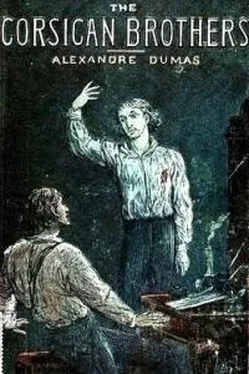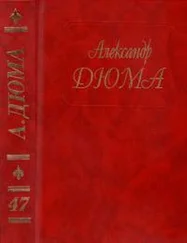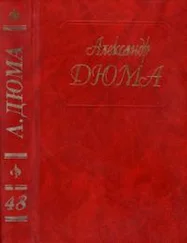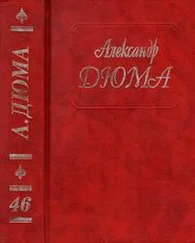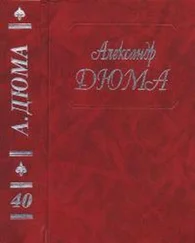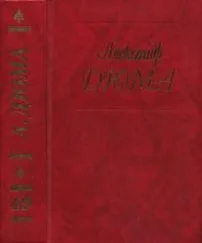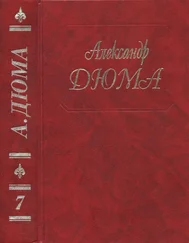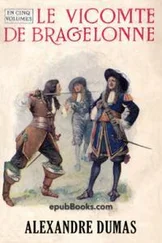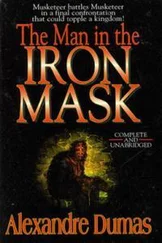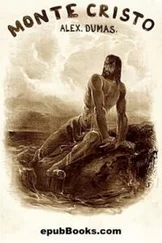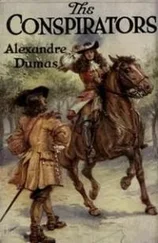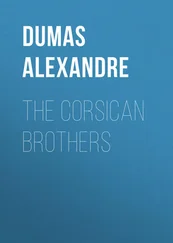"And how many lives have been sacrificed since?"
"Nine people have been killed altogether."
"And all for a miserable hen not worth twelve sous?"
"Yes, but as I said just now, it is not the cause, but the effect that we have to look at."
"Since there were nine people killed, then, there might easily be a dozen."
"Yes, very likely there would be if they had not appointed me as arbitrator."
"At the intercession of one of the two families no doubt?"
"Oh! dear no, at my brother's request, who heard of the matter at the Chancellor's house. I asked him what on earth they had to do in Paris with the affairs of an out–of–the–way little village in Corsica; but it seems the préfect mentioned it when he wrote to Paris, and said that if I were to say a word the whole thing would finish like a farce, by a marriage and a public recitation; so my brother took the hint, and replied he would answer for me. What could I do?" added the young man, throwing back his head proudly; "it shall never be said that a de Franchi passed his word for his brother, and that his brother did not fulfil the engagement."
"And so you have arranged everything?"
"I am afraid so."
"And we shall see the chief of one of these two parties this evening, no doubt?"
"Just so; last night I saw the other."
"Are we going to see an Orlandi or a Colona?"
"An Orlandi."
"Is it far from here?"
"In the ruins of the Castle of Vicentello d'Istria."
"Ah! yes—they told me those ruins were close by."
"Yes, they are about a league from here."
"So in three–quarters of an hour we shall be there?"
"Yes, in about that time."
"Lucien," said Madame de Franchi, "remember you speak for yourself. For a mountaineer as you are it is scarcely three–quarters of an hour distance, but recollect that our guest may not be able to proceed so quickly."
"That is true; we had better allow ourselves an hour and a half at least."
"In that case you have no time to lose," said Madame de Franchi, as she glanced at the clock.
"Mother," said Lucien as he rose, "you will excuse our leaving you, will you not?"
She extended her hand to him, and the young man kissed it with the same respect as he had previously done.
Then turning to me, Lucien said—
"If you prefer to finish your supper quietly, and to smoke your cigar afterwards―"
"No, no!" I cried; "hang it, you have promised me a bandit, and I must have one."
"Well, then, let us take our guns and be off."
I bowed respectfully to Madame de Franchi, and we left the room, preceded by Griffo, who carried a light.
Our preparations did not occupy us very long.
I clasped a travelling belt round my waist, from which was suspended a sort of hunting–knife, and in the folds of which I carried powder and ball.
Lucien soon re–appeared with his cartridge case, and carrying a double–barrelled Manton, and a sort of peaked cap, woven for him by some Penelope of Sullacaro.
"Shall I go with your Excellency?" asked Griffo.
"No, it will be useless," replied Lucien; "but you may as well loose Diamond, as we might put up a pheasant, and the moon is so clear we should be able to shoot as well as in daylight."
An instant afterwards a great spaniel bounded out, and jumped joyously around its master.
We had not gone many paces from the house when Lucien turned round and said—
"By–the–by, Griffo, tell them if they hear any shots on the mountain that it is we who have fired them."
"Very well, your Excellency."
"If we did not take some such precautions," said Lucien, "they would think that hostilities had recommenced, and we should soon hear our shots echoing in the streets of Sullacaro. A little farther on you will see a footpath to the right that will lead us directly up the mountain."
ALTHOUGH it was only the beginning of the month of March the weather was beautiful, and we should have said that it was hot, had it not been for a refreshing breeze which carried with it a savour of the sea.
The moon was rising brilliantly behind Mount Cagna, and the cascades of light were falling upon the southern slope which separates Corsica into two parts, and in a measure forms two different nations, which are always at war, or at least, detest one another heartily.
As we mounted we could see the gorge in which the Tavaro was buried in profound darkness, impossible to penetrate, but we could view the calm Mediterranean, like a vast steel mirror extending into the horizon.
There are certain noises one hears only at night, for during the day they are overcome by other sounds, or it may be they awake only with the darkness, and these produced not upon Lucien, who was familiar with them, but upon me, who was a stranger to them, curious sensations of surprise, and awoke in me a powerful interest in all that I saw.
When we reached the place where the path united with another—one going up the mountain direct, and the other to the right, Lucien turned to me and said—
"Are you anything of a mountaineer?"
"Yes, a little, as far as walking goes."
"You are likely to get giddy, then."
"I am afraid so. The precipice has an irresistible attraction for me."
"Then we had better take this foot–path where there are no precipices, but merely rough walking."
"I am quite equal to that."
"Very well, then, we have three–quarters of an hour's walk before us."
"Let us take the path."
Lucien then went first, and crossed through a little oak wood, into which I followed him.
Diamond trotted fifty or sixty paces away, beating right and left, and occasionally coming back to us, wagging his tail as much as to inform us that we might trust to him and continue our route in safety.
I saw that as some people like to possess a horse, equally for riding or driving, so Diamond had apparently been trained to hunt the biped or the quadruped, the bandit or the boar. I did not wish to appear altogether strange to Corsican manners, so I said as much to Lucien.
"You are mistaken," he replied; "Diamond is very useful in hunting men or animals, but he never chases bandits. It is the triple red of the gendarmes, the voltigeur, and the volunteer that he hunts."
"Then I suppose Diamond is a bandit's dog?"
"He is. He belongs to an Orlandi, to whom I sometimes used to send him into the country with bread, powder, bullets, or whatever he required. He was shot by a Colona, and the next day the dog came to me, for being accustomed to come to the house, he looked upon me as a friend."
"But," I said, "I fancied I saw another dog at your house."
"Yes, that is Brucso, he possesses the same qualities as Diamond, only he came to me from a Colona who was killed by an Orlandi, and so when I pay a visit to a Colona I take Brucso, but when I have business with an Orlandi I take Diamond. If I were to make a mistake and loose them both together they would kill each other. So," continued Lucien, with a bitter smile, "men can make it up, and will receive the sacrament together; the dogs will never eat from the same platter."
"Well," I said, laughing; "here are two regular Corsican dogs, but it seems to me that Diamond, like all other modest creatures, has gone out of earshot while we are speaking of him. I am afraid he has missed us."
"Oh, do not be alarmed," said Lucien, "I know where he is."
"May I inquire where?"
"He is at the Mucchio."
I was about to hazard another question, even at the risk of tiring my companion, when a long howl was heard, so lamentable, so sad, and so prolonged, that I shivered and stopped.
"What can that be?" I said.
"Nothing, it is only Diamond crying."
"What is he crying for?"
"His master. Do you not know that dogs do not forget those they have loved?"
Читать дальше
